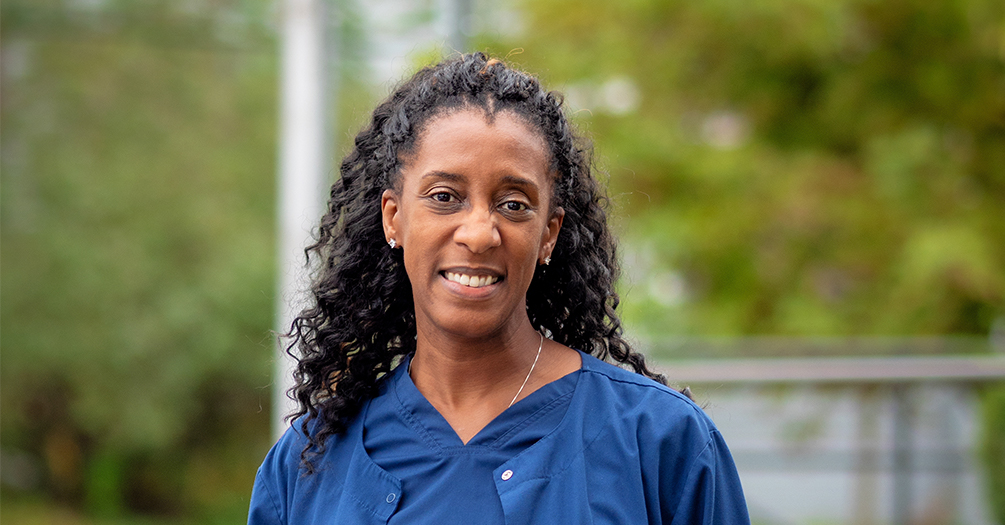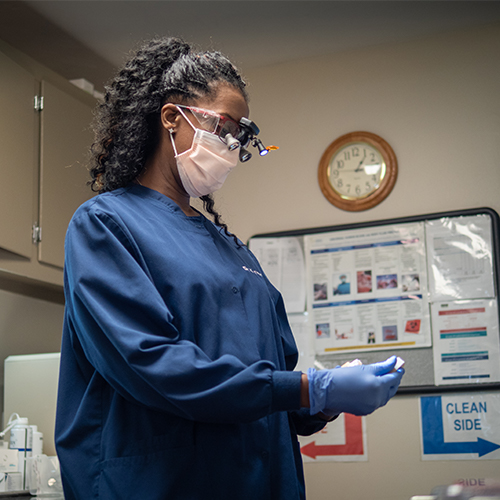Pandemic Galvanizes Dentist to Study Public Health

Kristi Thomas
Master’s Student, Online Population and Health Sciences Degree Program; Director, University of Michigan Dental School Community Dental Center
As much of our society began to shut down in April 2020 at the onset of the COVID-19 pandemic, Kristi Thomas was just gearing up to take on a new chapter in her career.
“The fact that we’re in a pandemic has, of course, been terrible. But, it’s also given some of us the opportunity to slow down and focus on the things that are important to us: our families, and to our overall mental and physical well-being. I was working remotely during some of this time and that gave me the ability to actually apply for my degree program and to start learning.”
Kristi is a trained dentist and has been practicing for over 21 years. She was called up when health professionals across the field were needed to pitch-in amidst the spread of the pandemic. “The health center that I was working with at that time was starting to provide COVID testing. Governor Whitmer gave dentists the ability to help in the COVID testing process. I was out there with the health center doing COVID nasal swabs and working to make sure that people got COVID testing and information materials. It was then that I thought, ‘I have to be able to do more’”.
Despite being an established dental professional, she recognized her limitations supporting her patients during this time. She wanted to understand the environmental factors, the epidemiology, the impacts of social determinants, and everything else she could need to know. For Kristi, the better informed she could become, the better she could make decisions to help her patients, so she applied to the MPH program in Population and Health Sciences.
Public health simply made sense as a next step for Kristi. “I know when people think about dentistry, they think about whitening, about veneers - about the cosmetic look. But I was always drawn towards those who didn't have a lot of dental knowledge or those who were under-represented.” Without realizing it, she had been concerned with aspects of public health before even taking a course. “I was more interested in those who had poor diets, who were getting a lot of cavities, who were never taught to take care of their teeth. Those are the people that need me most. ”
Reframing Dental Health
Kristi is an alum of the University of Michigan Dental School and now serves as the Director for the School of Dentistry’s Community Dental Center (CDC). In that role, she has contributed to a dental program that focuses on education and supporting patients with limited resources.
Throughout her career, Kristi has observed the non-medical factors that impact her patients and the gaps in traditional dental care. “At a point in my career I realized how much dentistry was considered to be a luxury or an add-on service of primary health. It frustrated me that some perceived oral health as separate from overall health.”
She spent a lot of time over the years having conversations with health providers about looking at dental care differently. “My work became about treating patients, making them healthier, and also trying to encourage other healthcare providers to realize that we all need to work together for overall health.”
Earning her MPH now is about gaining more tools to improve overall health and build stronger, evidence-based processes into the dental practice. Now, at the start of her second year, she’s already putting that goal into action for her team: “I'm taking what I’ve learned and applying it to what I'm actually doing in my clinic.” She explains how she is making her program capstone projects benefit others in the real world. “For my required applied practice experience (APEx) I’ll be designing a new brochure for the clinic highlighting the new practice model at CDC. It’s a faculty/student collaborative care clinic, meaning the students and professionals are truly practicing and working together”. Next semester, Kristi is planning to use her integrated learning experience (ILE) capstone requirement to evaluate and improve the clinic as well.

Kristi examines dental impressions at the Community Dental Clinic.
Public health education has impacted Kristi’s approach in the clinic in many ways. As a Community Dental Clinic, CDC applies for grants from public and private entities to provide dental care to those that are financially and physically challenged. “The Health Program Evaluation course I’m in now has shed light on the evaluation visits that grant providers perform for facilities like ours.” She now has a deeper understanding around grant requirements and measurements she may have previously followed without question. “It makes sense now and it’s galvanized me to think about ‘how can I go deeper?’. Next time I write a grant, I know I’m going to be able to take the time to build a strong evaluation process first and it will make a world of difference.”
The pandemic made it clear to many that public health insight is a vital resource to all realms of healthcare. So when Kristi is asked the question why would a dentist need public health training?, she has a simple answer: "Because all healthcare should treat the whole person, and that means understanding the bigger picture to offer the best solutions."
“Our job during covid was to perform emergent care - to keep people from going to the hospital. We were also trying to figure out how to deliver our dental care safely. This is dentistry, where people are breathing on you, bloodborne pathogens and saliva are constantly in our faces, and we needed to figure out how we could practice safely.”
She recalls a collaboration between the School of Dentistry and School of Engineering at the time that executed studies in the clinic to determine safe clinic layouts, how to position patients, and to evaluate HVAC systems to optimize air flow. Having this information and insight allowed for safer visits for patients, students, and staff.
Those experiences solidified her belief that public health is, in fact, a part of everything, “If we don't realize how the environment, epidemiology processes, and so forth, we could be just operating an unsafe facility. We need the advice of public health professionals and researchers in our healthcare spaces — we need all of that to understand how to deliver safe care.”
Kristi says her biggest inspiration in pursuing public health has been her daughters, Kori and Kayla. Both became interested in public health and helped spark Kristi’s desire to learn more. “They were very instrumental in this, they made me feel like it’s not too late to go back to learn new things.” Kayla is an undergraduate in her senior year at the School of Public Health and will be graduating at the same time as her mother. There will be a time to celebrate, but for now and into the future, they're enjoying the opportunity to have great conversations about public health.
In the end, for Kristi, that’s the key to everything — focusing on relationships: “Patients spend a lot of time with the hygienist, the dentist just comes in and maybe we do a procedure or we do an exam, and we leave. I’m focused on building relationships. From a public health standpoint —I think, it’s only when we take the time to really develop those relationships, that we’ll be able to provide better care.”
